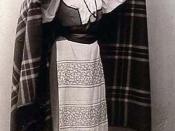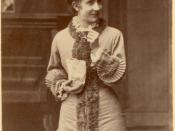Shedding a Porcelain Skin The plight of the psychologically repressed has captured the minds of intellectuals throughout all eras of time. However, none depicts this theme as well as A Doll House by Henrick Ibsen. Set in postmodern Victorian era in Norway, A Doll House explores the confines of a woman's role amidst the subservient attitude of a self-righteous society. Ibsen brilliantly prescribes the traditional structures of a tragedy while utilizing the daily drama of the common person in this fervent play. While a denied feminist, Ibsen's plays give way to the woman's movement and the freedom of the individual. As expected of this era, Ibsen's notions of autonomy and equal rights for both genders were not received well among Norwegian society. Nevertheless, A Doll House is thought of by young and old readers alike to be one of the truly great writings of the nineteenth century. The multitude of intricacies within this masterpiece reveals well-developed characters that are wrought with underlining denotations and extravagant symbolism.
Among these characters, is the main character and the protagonist, Nora Helmer. Nora is the obiedient wife of a Torvald Helmer and the mother of three small children. Child-like, insensitive and self-centered, Nora's character progresses through the play and systematically transforms from what seems to be an inexperienced, weak and compliant plaything to a respectable, independent and powerful women emerging from the delicacy of her porcelain body into the overwhelming shoes of freedom stemming from a doll house of captivity. In Nora's seeking the strength to find independence, her relationships with Dr. Rank and Kristine Linde significantly influenced the course of her transformation.
As mentioned, Nora is a seemingly meek, docile and fragile individual incapable of being autonomous from her domineering husband and the restrictions imposed on her by society. Although the transformation may pose to be problematic to some, there are several indications of its arrival throughout the play. While, Nora does not seem to mind her doll-like existence in which she is coddled, pampered and patronized, glimpses of her repressed personality are shown through her hidden acts of rebellion. First, as the play opens we learn that the "little lark" (43) has "been out throwing money around again"(44) and has "munched a macaroon or two" (46). Yet, despite the insignificance of an adult woman eating a desert, Torvald's reproach signifies that Nora is more like a child than a wife, further more, her need to rebel against Torvald represents the tension and deception upon which their relationship subsists. Additionally, Torvald's assertion that Nora is completely foolish of financial matters illustrates his deeply seeded prejudiced viewpoint on gender roles. In Torvald's eyes, the wife is meant to beautify the house and her husband's reputation. Torvald, as a man overly concerned about his status in society and, thus, easily swayed by the prospect of society's perception, is quick to scold Nora for acts that are unfavorable to the public. Although quick to ridicule those "with no religion, no morals, no sense of duty" (105) he would rather keep Nora, "a hypocrite, a liarâ¦infinitely disgusting"(105) and shameful creature in the house for the sake of "saving theâ¦appearances" (106) than face the scorn of society and bear the pressure of shattering his idealistic family delusions. Later it is revealed that, in fact, Nora does know more about finances then she lets on. Her illegal forging of the loan to care for her sick husband shows her courage as a woman capable of acting on her own behind her captive's back. The perpetual affectionately diminutive names by which Nora is called evokes her helplessness and her dependent figure with whose emotions Torvald can toy. Nora rejects these names at the end, however, up until then she continues to be constantly degraded. The theme of freedom is relevant throughout the play, however at crucial moments Nora expresses her desire for what she defines as freedom, which changes as her desire for independence increases. She exclaims, "how free you must feel" (51) to Kristine in act I. In act II, Nora questions the ramifications of her leaving as she inquires of Ann-Marie, the nurse, "Do you think [the children would] forget their mother if she was gone for good?" (73). And, in act III, Nora repeats her convictions of freedom as she explains to Torvald that she is "getting out of [her] costume" (107) and unveiling a newly defined woman with purpose and strength. These fundamental situations represent a specific line of progression carefully placed by Ibsen in order to sculpt Nora's liberation as a sovereign being.
This succession wasn't attained by Nora's doing alone, however, the good doctor had a firm hand in providing opportunities for Nora to erect her independent stature. Rather than providing the moral guidance and honorable example for the rest of the characters, as one would expect from his character type, Dr. Rank is a corrupt force, both physically and morally. Sick from consumption of the spine as a result of his father's sexual exploits, the doctor serves Nora's transformation as a figure of question, conviction and foreshadowing the events to come. The very fact that Dr. Rank suffers at the hands of his father and now his son suffers the disease as well, reiterates the theme of parental and filial obligations. By this reasoning, Nora feels unworthy of raising her children when she views herself as a corrupt criminal. Torvald examines, "nearly all young criminals had lying mothers." In act I, Dr. Rank comments about Krogstad that he is "a type of person who breathlessly, sniff[s] out hints of moral corruption, and then maneuvers his victim into some sort of key position where he can keep an eye on them" (58). This comment foreshadows Krogstad's later blackmail of Nora and gives way to Nora's denouncement of society, "what do I care about dreary old society?" (58). Also, Nora then purports to Dr. Rank her frustration with Torvald as she reveals that she most desires to tell him "to hell and be damned" (59). Here Dr. Rank, astonished, serves to relinquish Nora's most inner thoughts, that aren't clearly important now, but later in the play they become crucial to the step stones toward her transformation. In act II, Dr. Rank articulates to Nora about his impeding death, "then to suffer this way for somebody else's sins. Is there any justice in that? And in every single family, in some way or another, this inevitable retribution goes on" (81). Here, Ibsen has clearly revealed the predicament of the Helmer family as soon Torvald will bear the guilt and possibly suffer for Nora's sins. In that same act Dr. Rank explains to Nora that "those who go away are soon forgotten" (82) which echoes her question to Ann-Marie about who would care for the children should she leave. Finally in act III, Dr. Rank professes his love for Nora and gives her the power and command she has never had over another, certainly nothing Torvald has ever given her. This is a turning point in the play because it Nora, at first seeks to entice Dr. Rank by showing him her stocking in an attempt to persuade him to speaking with Torvald about keeping Krogstad at the bank, however when the opportunity arises, Nora seems to have some moral integrity realizing that she would be taking advantage of Dr. Rank's earnest love for her and, thus, refuses to ask the favor. The defining characteristic about Dr. Rank is that he is the one character who by large is unconcerned with the thoughts of others and is stoic in his acceptance of his unavoidable fate.
Kristin Linde plays a key role in shaping Nora's course for realization. Kristin is Nora's opposite in many ways. While Nora chose Torvald for herself, Kristine married for money to help her mother and brothers. The sacrificial role of the women is pictured most by Kristine. All she's known is to care for others and without someone to take care of she is lost and thus ends up becoming remarried to Krogstad, her once penniless love. Through several conversations and denouncements of Nora's impulsive childish acts and inexperience with the real world, Nora is forced to refute her claims and prove to herself that she is, in fact, capable of being an individual and doesn't need to rely on or be subservient to her husband. Kristine's older, weary viewpoint provides a foil for Nora's youthful impetuousness as well as a symbol of the ultimate hollowness of the matriarchal role. Her relationship with Krogstad also provides a point of comparison for that of Nora and Torvald. The upcoming masquerade is extremely important for Nora because, through the costumes and dance, she is able to embrace the basic elements of the basis of her relationship with Torvald that she is still trying to preserve; she can sing and dance for him as a lovely creature. Mrs. Linde refers to Nora's dress as her "fine feathers" reinforcing the general perception of Nora as a non-human entity, a creature free of cares. In fact, the dress itself serves as a potent symbol of Nora's character. Like Nora, it is torn and in need of repair. However, as in real life, Nora feels she is incapable of fixing the problem herself, giving the dress to Mrs. Linde to mend. The idea of the dress serving as a symbol for Nora's everyday mask is reinforced when Nora reports that Torvald dislikes seeing dressmaking in action. In other words, Torvald enjoys the character that Nora adopts but has no desire to see its origins, the real Nora.
This play questions the extent to which these are mere masks that Nora uses to negotiate the patriarchal oppression she faces every day. Over the course of the three acts, Nora emerges as a fully independent woman who rejects both the false union of her marriage and the burden of motherhood. In the end, the "wonderful thing" was that Nora and Torvald exchanged roles and found each other as they truly exist in reality. The question remains, who was most realistic in their view of themselves and the world? Their parting was inevitable for one cannot foster the identity of another if their own identity is unknown. Nora served the "duties to [her]self" (111) by choosing autonomy. Nora realizes that, before she can be a wife, she must first discover herself through venturing out into the world. She left an unformed soul, determined to become a full person rather than the doll of the male figures in her life.





